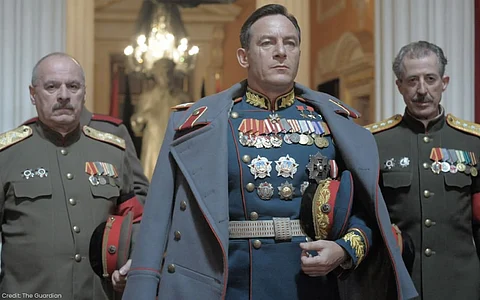The Death of Stalin: Political Satire When We Most Need It
I love political satire. It's my favourite genre of comedy. But right now, as we watch the world collapsing onto itself like a supernova, it doesn't feel enough to watch Leslie Knope battle a Paunchburger on Parks and Rec, or Selina Meyer struggle to stay relevant on Veep. No, it's time to bring the bigguns out. It's time to watch The Death of Stalin.
Armando Iannucci's film takes a bleak, cynical and very, very funny look at the hours following Stalin's death, when all the various higher-ups of the USSR found themselves wondering who exactly his successor would be. Now for context, Comrade Stalin is a Dictator with a capital D. He phones Radio Moscow to demand a recording of a concerto that's just concluded, forcing the studio executives to have it performed all over again. He forces his closest aides – Nikita Khruschev (Steve Buscemi in a fat suit and prosthetic nose), Lavrentiy Beria (Simon Russell Beale), Georgy Malenkov (Jeffrey Tambor), Vyacheslav Molotov (Michael Palin of Monty Python fame) and others to watch movies with him late into the night. He has lists of people to be killed – in one scene, Beria whispers "Goodbye, forever," as loyal old Molotov leaves after a party, having just learnt what is to become of Molotov the next day. Stalin is not a very nice man at all.
And so, when Stalin collapses after the recording of Maria Yudina's concert is delivered to him, there is fear and anxiety – and a little glimmer of scheming and planning. Beria rushes over,followed closely by Khruschev. They realise that all the best doctors are "in the gulag or dead." And when an old doctor who has escaped this fate is finally found, and Stalin does die, the Central Committee must organise his funeral while also participating in a murderous power struggle for control of the Soviet Union. Oh, and did I mention that the army, led by Marshall Zhukov (Jason Isaacs, aka, Lucius Malfoy), gets involved too?
It's all very exciting, as you might expect, and all the actors get plenty of hilarious one-liners. Iannucci has the actors speak in their natural accents and this works perfectly. You may not have had American, or Yorkshire, or Estuary accents in Stalinist Russia, but chances are that they weren't speaking English in Stalinist Russia anyway.Instead, The Death of Stalin gives you Steve Buscemi's manic, fast-talking Bugs-Bunny-meets-confidence-trickster pace with Jason Isaacs gleefully playing the action hero making an entrance in every frame, ("Right, what's a war hero got to do to get some lubrication around here?," he says) punctuated by Simon Russell Beale's Beria handing out death lists with the air of a headteacher in an English boarding school ("Shoot her before him, but make sure he sees it… oh, and this one, kill him, take him to his church and dump him in the pulpit") Oh, and there is swearing, and plenty of it – F-bombs are dropped in abundance, with all the glee of a middle school classroom that's just learned what the word means.
The movie does take some liberties with fact – the infamous concert actually took place nine years before Stalin's death – but the broad mood of the film is accurate enough. Iannucci spares no effort to depict the characters as unpleasant, terrible people. Michael Palin's Molotov is such a stickler for the rules that he refuses to see that his beloved wife Polina was falsely implicated in the Stalinist purges. Malenkov,who takes charge of the Central Committee immediately after Stalin's death, is clueless and ineffective. Khruschev's ambition and desire to be top dog are transparent and plainly visible in his ham-fisted interactions with those around him. And while Beria is a nasty, manipulative, heartless man, his preference for, um, very, very young women is what makes him truly chilling. To his peers on the committee, this is not the worst thing about him, although they will use it against him when it's convenient. There are no heroes here.
And that is what makes The Death of Stalin so perfect. The higher ups of the Central Committee, Stalin included, are treated with an irreverence bordering on disdain. There is a human face behind the pomp and show, and it isn't pretty.Is this a metaphor for a post-truth world? Whatever it is, it's certainly ridiculously, outrageously funny.

